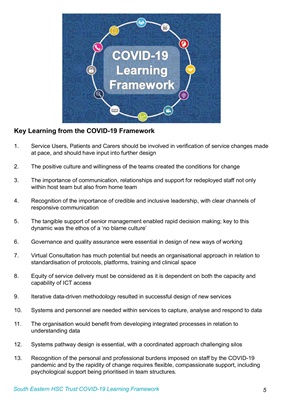
Key Learning from the COVID-19 Framework
1. Service Users, Patients and Carers should be involved in verification of service changes made
at pace, and should have input into further design
2. The positive culture and willingness of the teams created the conditions for change
3. The importance of communication, relationships and support for redeployed staff not only
within host team but also from home team
4. Recognition of the importance of credible and inclusive leadership, with clear channels of
responsive communication
5. The tangible support of senior management enabled rapid decision making; key to this
dynamic was the ethos of a 'no blame culture'
6. Governance and quality assurance were essential in design of new ways of working
7. Virtual Consultation has much potential but needs an organisational approach in relation to
standardisation of protocols, platforms, training and clinical space
8. Equity of service delivery must be considered as it is dependent on both the capacity and
capability of ICT access
9. Iterative data-driven methodology resulted in successful design of new services
10. Systems and personnel are needed within services to capture, analyse and respond to data
11. The organisation would benefit from developing integrated processes in relation to
understanding data
12. Systems pathway design is essential, with a coordinated approach challenging silos
13. Recognition of the personal and professional burdens imposed on staff by the COVID-19
pandemic and by the rapidity of change requires flexible, compassionate support, including
psychological support being prioritised in team structures.
South Eastern HSC Trust COVID-19 Learning Framework 5